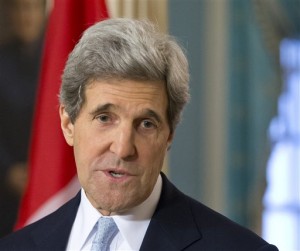MANILA, Philippines — The United States has thrown its full support behind the Philippines’ bid to settle disputes with China in the West Philippine Sea (South China Sea) through arbitration as the country’s long-time defense ally underscored its importance as a partner in the Asia-Pacific.
In remarks before talks with Foreign Secretary Albert del Rosario in Washington D.C. Tuesday morning (US time), Secretary of State John Kerry also reiterated his government’s support for a code of conduct in the disputed waters, a critical international sea lane.
“The Philippines is one of our five Asia-Pacific allies and a very, very important relationship at this point in time when there are tensions over the South China Sea, where we support a code of conduct, and we are deeply concerned [about] some of those tensions and would like to see it worked out through a process of arbitration,” said Kerry in remarks before media at the US State Department.
Del Rosario said Kerry expounded on this during their meeting and “emphasized the importance the United States gives to maintaining peace and stability in the area.”
“More importantly, Secretary Kerry assured me that the US is committed to supporting the efforts of the Philippines to settle the disputes peacefully and in accordance with the rule of law,” said Manila’s top diplomat.
Del Rosario’s meeting with Kerry in Washington is the first for the two officials since Kerry’s appointment earlier this year.
During their talks, Del Rosario updated the US official on the country’s arbitration bid currently pending before the United Nations arbitral tribunal.
Filed in January, the legal action seeks to stop Chinese incursions into parts of the West Philippine Sea within established Philippine maritime boundaries and nullify China’s “nine-dash line” claim to the waters, which places almost all of the sea’s resource-rich territories within its domain.
“I emphasized its (arbitration) importance to the future stability of our region in particular and to the future efficacy of international law in general,” Del Rosario said in a statement.
“I stressed that we are committed to seeing this arbitration through. There should be no confusion or any doubts about our resolve,” he added.
China has formally rejected the Philippine move, asserting its “indisputable sovereignty” over the waters and reiterating that the dispute may only be resolved through direct negotiations. Under the rules, however, arbitration proceedings would proceed even without the participation of the other party.



